Removal Procedure
- Disconnect both the battery negative cables from the batteries. Refer to Battery Cable in Engine Electrical.
- Drain the cooling system. Refer to Cooling System Draining and Filling in Engine Cooling.
- Remove the upper fan shroud from the radiator. Refer to Fan Shroud Replacement in Engine Cooling.
- Remove the drive belt from the drive pulleys. Refer to Drive Belt Replacement .
- Remove the upper intake manifold from the lower intake manifold (L 56 shown). Refer to Intake Manifold Replacement .
- Remove the lower intake manifold from the cylinder heads. Refer to Intake Manifold Replacement .
- Remove the air conditioning compressor from the left accessory bracket and position to the side and secure.
- Remove the left accessory bracket from the cylinder head (if servicing the left cylinder head). Refer to Accessory Brackets Replacement .
- Disconnect the vacuum line from the vacuum pump.
- Remove the right accessory bracket from the cylinder head (if servicing the right cylinder head). Refer to Accessory Brackets Replacement .
- Remove the thermostat crossover from the cylinder heads. Refer to Thermostat Housing Crossover Replacement in Engine Cooling.
- Remove the engine cooling fan from the water pump. Refer to Fan Clutch Replacement in Engine Cooling.
- Remove the fuel filter/water separator from the cylinder head and locate to the side.
- Raise the vehicle and support with safety stands.
- Remove the lower radiator shroud from the radiator. Refer to Fan Shroud Replacement in Engine Cooling.
- Remove the exhaust crossover pipe from the exhaust manifolds. Refer to Exhaust Crossover Pipe Replacement in Engine Exhaust.
- Lower the vehicle.
- Remove the turbocharger assembly from the exhaust manifold. Refer to Turbocharger Replacement .
- Remove the glow plugs and the shields from the cylinder head (left side shown).
- Remove the left exhaust manifold from the cylinder head (if servicing the left cylinder head). Refer to Exhaust Manifold Replacement .
- Remove the right exhaust manifold from the cylinder heads (if servicing the right cylinder head). Refer to Exhaust Manifold Replacement .
- Remove the ground strap from the right rear cylinder head.
- Remove the valve rocker arm covers from the cylinder heads. Refer to Valve Rocker Arm Cover Replacement .
- Remove the front lower cylinder head bolt (5) and drain the coolant from the engine block.
- Remove the valve rocker arm, shaft, and the push rods from the cylinder head. Refer to Valve Rocker Arm, Shaft, and Push Rod Replacement .
- Remove the transmission oil level indicator from the right rear cylinder head.
- Remove the cylinder head bolts in sequence from the engine block.
- Remove the cylinder head from the engine block.
- Remove the cylinder head gasket from the engine block.
- Disassemble the cylinder head assembly. Refer to Cylinder Head Disassemble .
- Inspect the sealing surfaces of the engine block.
- Clean the threads on the cylinder head bolts.
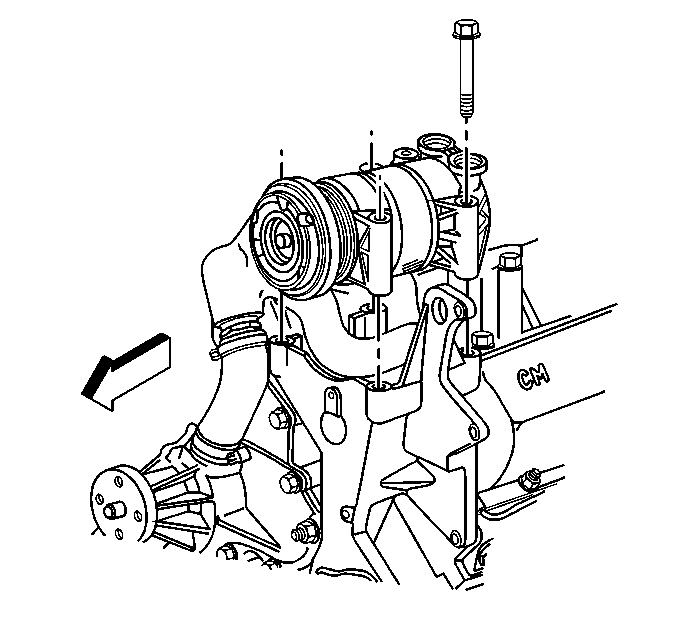
Important: When performing the following service procedure, it is not necessary to completely remove the A/C compressor from the vehicle.
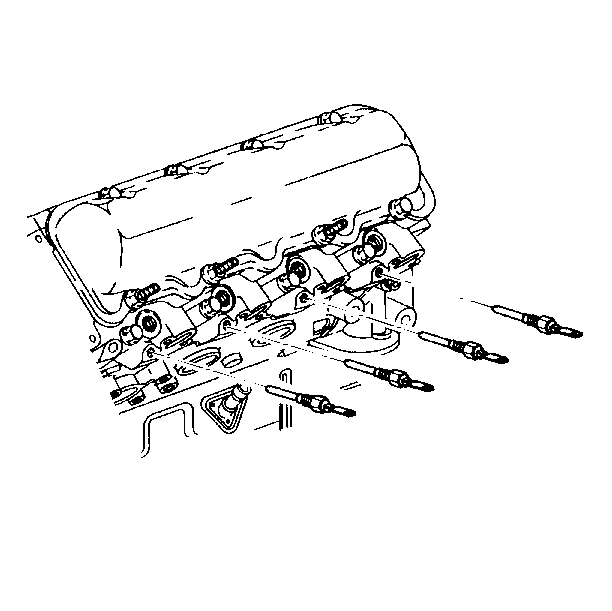
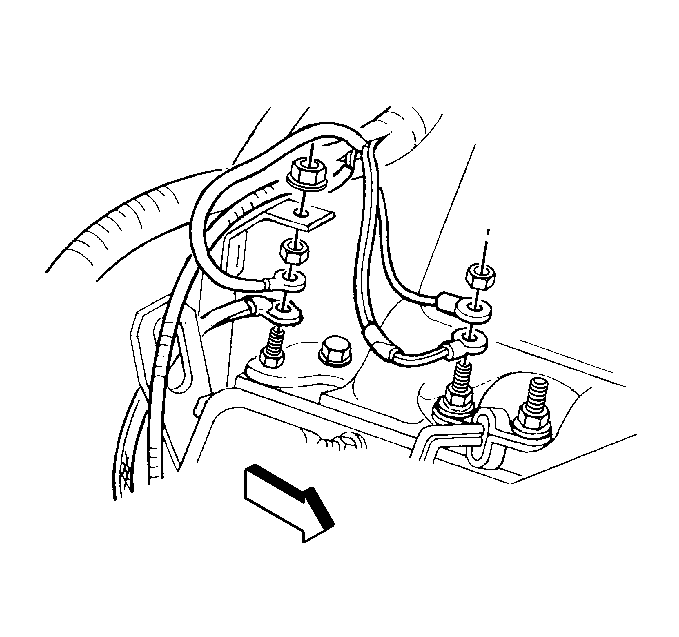
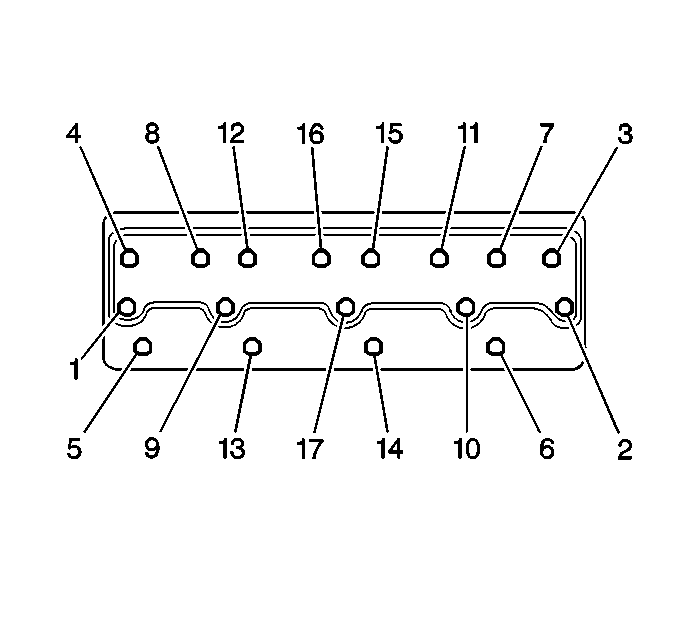
| 24.1. | Insert a copper tube 3/8 in x 12 to 18 in long into the cylinder head bolt hole with a hose attached. |
| 24.2. | Siphon the coolant from the cylinder head. |
Important: Use a rubber band to secure the left rear cylinder head bolt into position before removing the cylinder head.
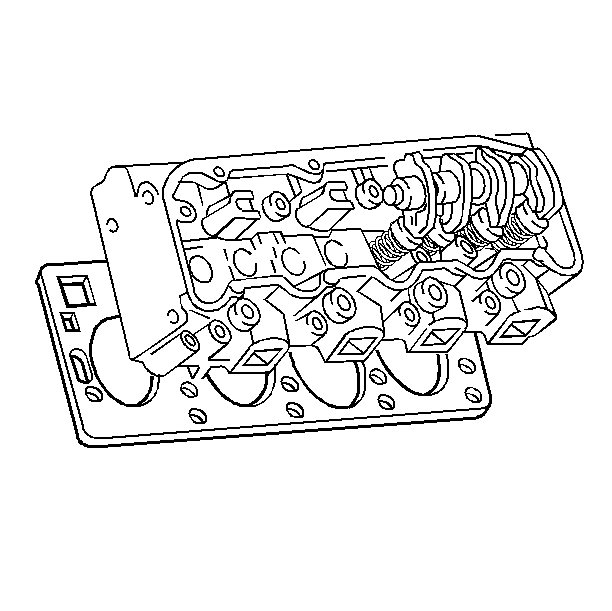
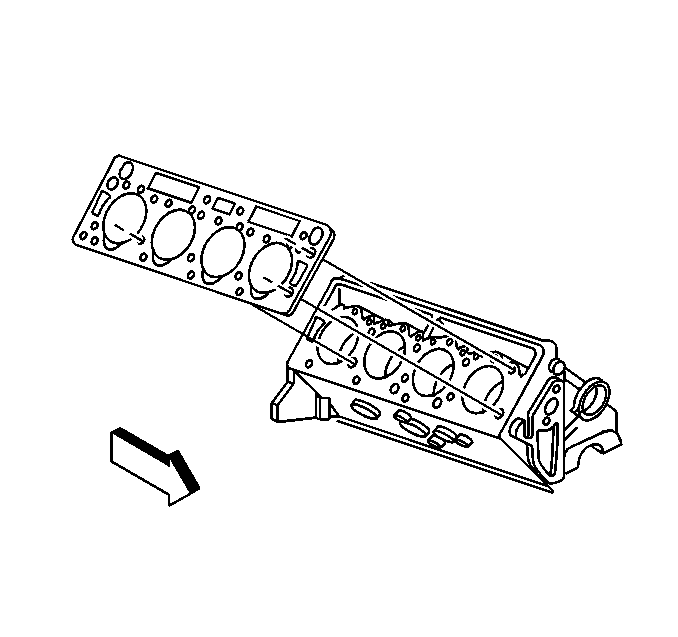
Installation Procedure
Important: The engine block surfaces must be clean. Do not use a sealer on the cylinder head gaskets. The cylinder head gaskets are manufactured with the proper amount of sealant "Printed" on its surface. Additional sealer may cause leakage or a malfunction. In addition, some sealers may attack the sealant already on the cylinder head gasket.
Important: The cylinder head gasket material is soft. Handle the cylinder head gasket with care and make sure that the sealing surfaces are not damaged.
- Assemble the cylinder head. Refer to Cylinder Head Assemble .
- Install the cylinder head gaskets to the engine block.
- Apply thread sealant to the cylinder head bolts before installing.
- Install the cylinder head to the engine block.
- Apply sealant GM P/N 12346004 or equivalent to the bolt threads and under the bolt heads.
- Install the cylinder head bolts and tighten in sequence in four passes.
- Tighten the bolts to 25 N·m (20 lb ft).
- Tighten the bolts to 75 N·m (55 lb ft).
- Retighten the bolts to 75 N·m (55 lb ft).
- In sequence, tighten all bolts an additional 90 to 100 degrees (1/4 + turn).
- Install the valve rocker arm, shaft, and the push rods in the cylinder head. Refer to Valve Rocker Arm, Shaft, and Push Rod Replacement .
- Install the valve rocker arm covers to the cylinder head. Refer to Valve Rocker Arm Cover Replacement .
- Install the thermostat housing and the bypass hose to the cylinder heads and the engine block. Refer to Thermostat Housing Crossover Replacement in Engine Cooling.
- Install the ground strap to the right rear cylinder head.
- Install the left accessory bracket to the cylinder head (if servicing the left cylinder head). Refer to Accessory Brackets Replacement
- Install the right accessory bracket to the cylinder head (if servicing the right cylinder head). Refer to Accessory Brackets Replacement .
- Connect the vacuum line from the vacuum pump.
- Install the lower radiator shroud to the radiator. Refer to Fan Shroud Replacement in Engine Cooling.
- Install the engine cooling fan to the water pump pulley. Refer to Fan Clutch Replacement in Engine Cooling.
- Install the lower intake manifold (L 65 shown) to the cylinder heads. Refer to Intake Manifold Replacement .
- Install the fuel filter/water seperator to the cylinder head.
- Install the right exhaust manifold to the cylinder head (if the right cylinder head is being serviced). Refer to Exhaust Manifold Replacement .
- Install the left exhaust manifold to the cylinder head (if the left cylinder head is being serviced). Refer to Exhaust Manifold Replacement .
- Install the glow plugs and the shields to the cylinder head (right side shown).
- Install the upper intake manifold to the lower intake manifold. Refer to Intake Manifold Replacement .
- Install the engine wiring harness if necessary.
- Install the turbocharger assembly to the exhaust manifold. Refer to Turbocharger Replacement .
- Install the transmission oil level indicator and tube.
- Raise the vehicle.
- Install the exhaust crossover pipe to the exhaust manifolds. Refer to Exhaust Crossover Pipe Replacement in Engine Exhaust.
- Lower the vehicle.
- Install the drive belt on the pulleys. Refer to Drive Belt Replacement .
- Install the upper fan shroud to the radiator. Refer to Fan Shroud Replacement in Engine Cooling.
- Install the engine cover to the upper intake manifold.
- Refill the cooling system. Refer to Cooling System Draining and Filling in Engine Cooling.
- Connect both the battery negative cables to the batteries. Refer to Battery Cable in Engine Electrical.

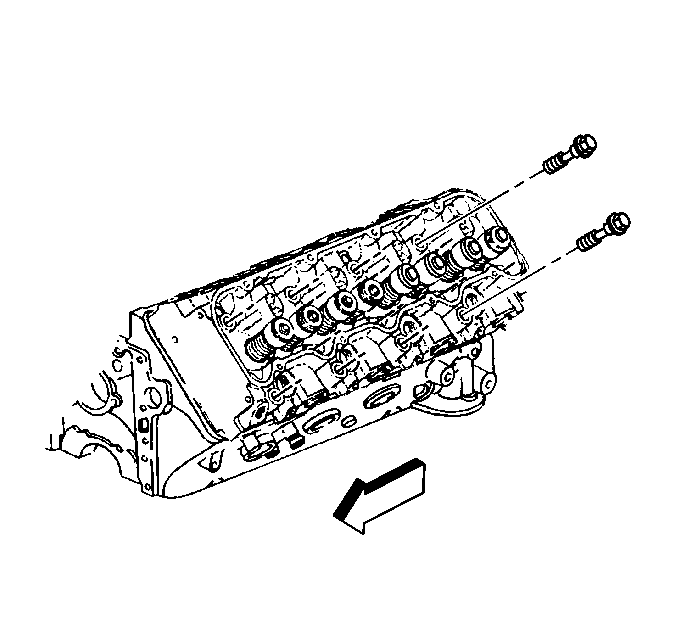
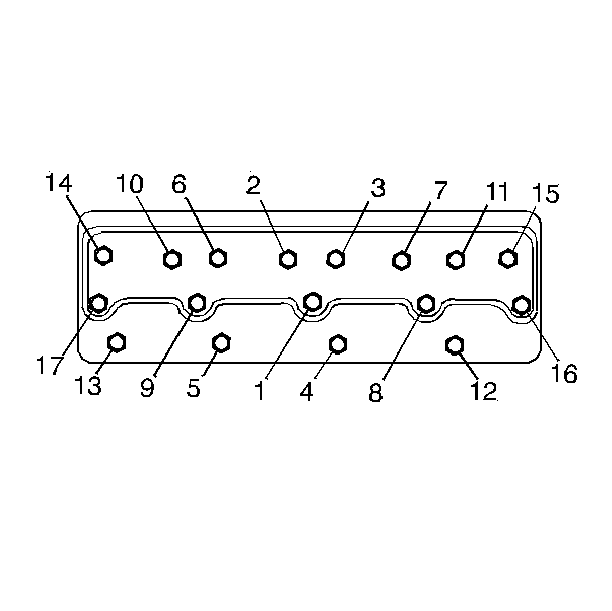
Important: Use a rubber band to hold the rear cylinder head bolt to the cylinder head (passenger side cylinder head only). Due to the clearances, the bolt must be installed at this time.
Notice: Use the correct fastener in the correct location. Replacement fasteners must be the correct part number for that application. Fasteners requiring replacement or fasteners requiring the use of thread locking compound or sealant are identified in the service procedure. Do not use paints, lubricants, or corrosion inhibitors on fasteners or fastener joint surfaces unless specified. These coatings affect fastener torque and joint clamping force and may damage the fastener. Use the correct tightening sequence and specifications when installing fasteners in order to avoid damage to parts and systems.
Tighten

Important: Cover the opening from the lower intake manifold to the upper intake manifold, as to not allow foreign material to fall in.
Important: Cover the turbocharger mounting surface so as to not allow any foreign material to fall into exhaust manifold or cylinder head.

